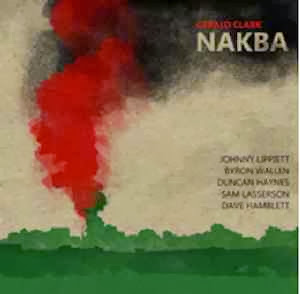CD Review: Gerald Clark - Nakba
http://networkedblogs.com/TtEZM
Gerald Clark -Nakba
(The Interrupting Sheep BAA002. CD review by Sarah Chaplin)
New Zealand-born film composer/ songwriter / arranger Gerald Clark has only a minimal track record in the jazz world, and no particular personal connections to Palestine and its painful history, yet his beautiful, poignant jazz-infused suite arises from a deep sense of outrage at the brutality being waged there.
Clark was initially inspired by a talk given by the mother of Tom Hurndall, the British photography student and a member of the International Solidarity Movement who was killed in Palestine in 2004. He has been working on the pieces since 2002, and the potency of the full and proper gestation which the music has undergone really shines through.
If this album were a speech rather than a suite of music, it would be delivered calmly and with dignity. It would highlight the historical turning points with great precision, but without any histrionics. It would leave the listener with an acute awareness of the inherent injustice of the situation while at the same time being conscious of the incredible resilience of the human spirit. But as a speech, it would not be capable of evincing the level of pathos that the searing and lyrical lines both saxophone (Johnny Lippiett) and trumpet (Byron Wallen) achieve here, nor would it deliver the urgency and energy supplied here by the bass (Sam Lasserson) and drums (Dave Hamblett), and it could never convey the different qualities of tension and release that pianist Duncan Haynes explores.
At times it seemed to me that saxophone and trumpet were pitched against each other across warring enemy lines as in Jenin, at others their intertwined voices work together like brothers in arms as in the heartfelt ballad Tom and Rachel. On 4 to 1, Clark has Lippiett joining the plaintive trumpet call with immense pauses describing a ravaged land. In toying with something as simple as scale choice in their solos, these musicians collectively weave dark arabesque tonalities together with more major harmonies – which had the effect for me of drawing attention to how deep-seated and culturally specific these clusters of notes can sound.
Clark made the decision not to play on this album himself, choosing instead to orchestrate and produce the finished product, including securing all the funding for its mixing and mastering. This bold move perhaps gave him a greater degree of objectivity, enabling him to stay in charge of the complexities lurking within these supple and at times tender tunes, to the extent that they are effortlessly paced and executed with great attention to detail. There are shifts in time signature and dynamics that you only really notice the second or third time you listen, when the true cohesiveness of the album makes it presence felt.
Released at a time when awareness of the situation in Palestine is becoming more widespread and the condemnation of human rights violations all the more vocal, music such as this raises emotional consciousness about the precarious fate of a region and its people.
With captivating original artwork by Imogen Mitchell, Nakba is not an album to be put on in the background. It should heard be fully and directly.
